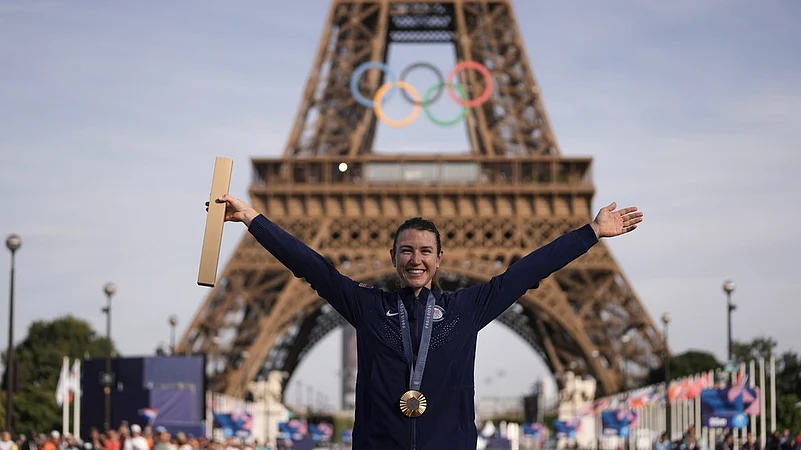Forty years after winning gold in Los Angeles, Connie Carpenter-Phinney watched in nervous anticipation — praying, pleading, holding her breath in hope — that Kristen Faulkner could hold on in the road race at the Paris Olympics. (Medal Table | Schedule & Results | Full Coverage)
Paris 2024 Games: Kristen Faulkner Joins Connie Carpenter-Phinney As Second US Olympic Road Race Champion
It was a monumental upset, given that Faulkner wasn't even supposed to race Sunday.

When she did, completing an audacious ride amid the shadows of the Eiffel Tower, Carpenter-Phinney was no longer alone.
She was no longer the first, and last, woman to win a road cycling gold medal for the United States.
“It was a beautiful finish,” Carpenter-Phinney told The Associated Press, “and I'm proud to have this company in this small and very special category of women Olympic road race champions.”
It was a monumental upset, given that Faulkner wasn't even supposed to race Sunday.
The Americans only qualified two spots in the women's road race for Paris. Chloe Dygert automatically received one by winning the world time trial title, and Taylor Knibb secured the other by winning the US time trial title. But, when Knibb withdrew so she could focus on the triathlon, Faulkner became the obvious replacement.
She already was on her way to Paris to compete with Dygert in the team pursuit in the velodrome. And, her road resume this season had been outstanding.
Faulkner won Omloop van het Hageland, a prestigious one-day road race in Belgium, and she had captured a stage at La Vuelta Feminina, one of the biggest events on the women's calendar.
She also won the US road race in May, even though it didn't get her automatically on the Olympic team.
“I made an agreement with my track coaches that I would only do the road race if I felt that I was medal-capable," she said, "and if at any point I got dropped from the front group and I was no longer in contention for a medal, I would pull out."
That never happened. Faulkner spent all of Sunday at the sharp end of the Olympic race, which started from the Trocadero and headed off into the French countryside before returning to Paris for three loops up the iconic hill of Montmartre.
It looked as if it might have been for nought when Marianne Vos, the former Olympic champion and arguably the greatest rider in history, was joined by Blanka Vas on the attack.
The two worked together to build a sizeable gap, and Faulkner had to put her head down and start chasing, eventually joined by Belgium's Lotte Kopecky in the endeavour. It was Faulkner who did most of the work to bring back the two leaders, though.
So, it was fitting that she — rather than the favoured Kopecky — was the one who kept going when the four came together.
The American attacked down the left side of the road while the other three stared at each other, trying to decide who would take up the chase. By the time they decided, Faulkner was so far ahead they never had a chance to catch her.
“She needed to get rid of us,” Kopecky said. “She did what she had to do, but you also have to dare to do it.”
Meanwhile, Carpenter-Phinney was counting down the kilometres until Faulkner joined her as an Olympic champion.
The similarities between them don't end there, either. Before the 31-year-old Faulkner became an investment banker and began riding bikes on a lark in 2017, she had rowed for Harvard. Carpenter-Phinney had done the same for California, Berkeley.
“Kristen's well-timed late-race move was perfect,” said Carpenter-Phinney, whose son and former Olympic cyclist Taylor Phinney was in the Parisian crowd, cheering both for the Americans and his wife, the Polish rider Kasia Niewiadoma.
“I knew she was capable,” Carpenter-Phinney said. The cycling program at the Olympics was far different in 1984 than it is these days.
There were only eight gold medals on offer back then, split between the road and track, and the road race was the only event for women.
There will be 22 golds handed out in Paris in events ranging from mountain biking to freestyle BMX and BMX racing.
So, too, has the American team changed. It was the dominant force 40 years ago, winning four of the eight gold medals and nine in all in Los Angeles.
That included Alexi Grewal's gold in the men's road race and Rebecca Twigg's silver in the women's race.
The US has not won more than five cycling medals in any Summer Games since then.
But, as the focus of cycling at the Paris Games shifts to the track at the National Velodrome of Saint-Quentin-en-Yvelines on Monday, the Americans already have four in their pocket — along with Faulkner's gold, silver for Haley Batten in mountain biking and Perris Benegas in freestyle BMX, and bronze for Chloe Dygert in the time trial.
And, with the pursuit team a medal favourite, and Jennifer Valente the defending omnium champ, the US is poised for its best medal haul since Los Angeles.
“We have a very strong medal chance in the team pursuit,” said Faulkner, who will be joined in the velodrome by Dygert, Valente, Lily Williams and Olivia Cummins for qualifying Tuesday. “USA Cycling wants to win medals. That's why we're here.”
- Previous Story
 Global Chess League: Viswanathan Anand, Magnus Carlsen Draw Opening Day's Top Duel
Global Chess League: Viswanathan Anand, Magnus Carlsen Draw Opening Day's Top Duel - Next Story

























